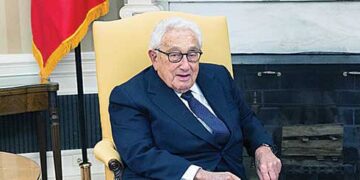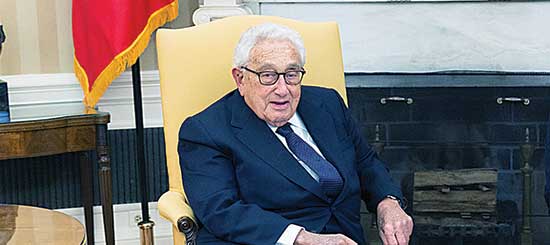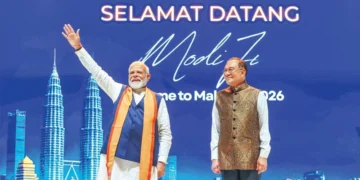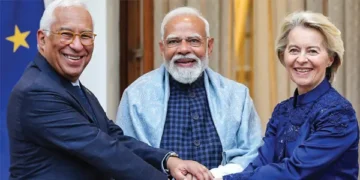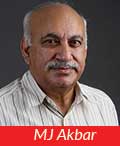 IN 1938 Heinz Alfred Kissinger, born 15 years earlier in German Bavaria, escaped Hitler’s Holocaust, reached the sanctuary of America, became Henry, joined the US Army in 1943 and emerged a decorated war hero with the rank of sergeant in the military intelligence unit stationed in Berlin.
IN 1938 Heinz Alfred Kissinger, born 15 years earlier in German Bavaria, escaped Hitler’s Holocaust, reached the sanctuary of America, became Henry, joined the US Army in 1943 and emerged a decorated war hero with the rank of sergeant in the military intelligence unit stationed in Berlin.
By the 1950s he was an academic luminary at Harvard; in the 1960s he began searching for a place in politics and Government. The appointment with destiny came in January 1969. President Richard Nixon appointed him National Security Advisor.
Kissinger and the limelight were made for each other. Within the next five years, he swept aside the mouldy assumptions of chanceries, and reinvented the axis of global equations with breakthrough ideas implemented with breathtaking insouciance.
His first great success became an independent chapter in world history. It also proved to be a primary cause of his greatest failure.
Cold War mindset
On March 2, 1969, or within two months of his appointment, China attacked Soviet troops on the Ussuri river border; the shooting lasted six months. Kissinger read the meaning perfectly. The adhesive of communist ideology could not compete with the demands of national interest.
It is difficult to comprehend, at this distance, the dogmatic rigidity of the Cold War mindset. The two enemies genuinely believed that the other was evil; neither wanted to sup with the devil. Kissinger envisaged a détente between Washington and Beijing that would smash the bipolar order, freeze Russian troops on two frontiers, and undermine communist solidarity across the globe. Nixon, to his credit, gave Kissinger his head. The risks were high. The State Department was blindsided, and later furious when the audacious initiative became public.
Suffice it to say, when Mao Zedong and Nixon had finished playing ping-pong, sold Taiwan into the margins, and negotiated a seat for Beijing at the UN Security Council, the sole hero was Henry Kissinger. The media preferred him to Nixon in any case.
Kissinger remained ever grateful to Pakistani President (General) Yahya Khan for being the enabler of his first, secret foray to Beijing. If word had leaked, or mission failed, Kissinger would have been dumped without ceremony by his political master. But the bamboo curtain in Beijing and the army shield in Islamabad hid their secrets well.
The Bangladesh war
Unusually for a professional cynic, Kissinger allowed sentiment to colour his actions in the next challenge he faced: the Bangladesh liberation war. Indeed, he might have been more helpful to his friend and now client Yahya Khan had he been more objective. Reasonable analysis indicated that sustained economic neo-colonialism, followed by the Pakistan army’s barbaric massacres from March 1971, had provoked this national upsurge and the great exodus of millions of refugees to India. Instead, Kissinger personalised the problem, blaming Indira Gandhi and India for America’s abject failure to save the unity of Pakistan. Indira Gandhi, deeply indifferent to Kissinger’s posturing and defiant against Nixon’s threats of intervention, refused to betray the Bangladeshis or compromise India’s interests.
Kissinger, and indeed Nixon, gave vent to their bitter pique in private conversations, unaware that they were being taped by an internal White House recording mechanism. These tapes, declassified in July 2005, shocked Kissinger’s admirers and justified his critics. In 1971, a nasty Nixon had angrily dismissed Indira Gandhi as “an old witch”. Kissinger’s abusive slur against her is unprintable.
Spreading invectives A sharp tongue can be the preferred partner of a brilliant mind, but when Dr Kissinger put it into play, he meant it to sting. No one will mourn him in Dhaka; he dismissed Bangladesh as a “basket case”. Always ready to spread invective, he called Indians habitually aggressive, adding, in case you had missed the point: “Indians are bastards anyway” as well as “most sexless” and “pathetic”.
Of all the epithets I find “sexless” most amusing, not least because Henry always took smug pride in being, to devise a term, “sexfull”. When single, he ensured raised eyebrows in Washington by dating Hollywood glamour. Inevitably, his lifestyle encouraged bad puns. The envious called him Kissingher.
